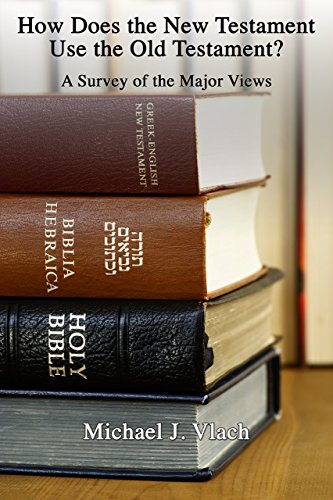 Over the last 3 months or so my wife and I have been doing a challenge to read the whole Bible in 100 days, and we have been reading the New Testament for the last few weeks. As i have been reading, it has proved to present me fresh with the challenges we face in understanding the ways the New Testament uses the Old Testament. This issue can be a major challenge for dispensational theology, though it can be for other areas too. With this in mind, I decided to get a digital booklet titled How Does the New Testament Use the Old Testament?: A Survey of the Major Views by Michael J. Vlach. I was very pleased by what I found as I have been able to read it over the last two days.
Over the last 3 months or so my wife and I have been doing a challenge to read the whole Bible in 100 days, and we have been reading the New Testament for the last few weeks. As i have been reading, it has proved to present me fresh with the challenges we face in understanding the ways the New Testament uses the Old Testament. This issue can be a major challenge for dispensational theology, though it can be for other areas too. With this in mind, I decided to get a digital booklet titled How Does the New Testament Use the Old Testament?: A Survey of the Major Views by Michael J. Vlach. I was very pleased by what I found as I have been able to read it over the last two days.
Dr. Vlach begins with a clear introduction of what he is trying to do, and that is summarize views without necessarily focusing on personalities. He then goes forward to discuss in seven chapters seven different views on this issue. The seven views he discussed are as follows:
- Single Meaning-Multiple Application
- Human Meaning plus Hidden Divine Meaning [sensus plenior]
- Contemporary Judaism/Second Temple Judaism
- Canonical Interpretation
- Inspired Sensus Plenior Application
- Historical-Exegetical and Theological-Canonical
- New Testament Reinterpretation of the Old Testament.
After discussing each of these views, Vlach also spends a chapter going over four test cases that are very common to this debate: (1) Acts 2:25-28 (referring to Psalm 16:8-11), (2) Galatians 3:16 (referring to the “Seed” in Genesis), (3) Matthew 2:15 (referring to Hosea 11:1), and (4) 1 Corinthians 9:9-10 (referring to Deuteronomy 25:4). Interestingly, the last test case was one of the passages I had noticed earlier in my reading. Finally, Vlach concludes the book with some helpful suggestions for future study, and I especially found helpful his identifying of the topic of how much we can learn about Jesus from the OT as something for future study. This is something I have almost subconsciously felt I needed to do, given that some of our problems in this area of NT use of the OT do concern messianic prophecy.
There are two aspects that made the book extremely helpful. First, it was highly readable. I am not normally a fast reader, but at > 100 pages I was able to read it in 2 days. Second, Vlach effectively described the views with his own summaries combined with appropriate quotations from key figures along with concrete examples. Furthermore, he also hit on the key names concerning various views too, with extensive footnotes that would make future study easy to do on a given issue. His work was well researched, with references to a large amount of the literature on this topic. Reading his work makes me feel I got an unbiased summary of sorts of the literature on the topic (and a lot of it I haven’t read yet). This booklet’s summaries will make it easier for me to go back and read the other literature. Vlach also effectively gave helpful comments on the issues as he went along, while still staying faithful to his goal of faithfully summarizing what others were saying.
By way of critique, I will say that there were some times when I felt that he may have been a little too non-committal on issues under given discussion given the importance for this issue to dispensational theology. However, his final section does mitigate this by his discussion of dispensationalism versus covenant theology and its significance for the topic at hand. In that final section, he observed there is not a one to one relationship between one’s views on this topic and the topic of dispensationalism and covenant theology (e.g. Kaiser being more dispensational and Beale being covenant shared a lot of similarities at various points), but he admits that one’s position on this matter will tend that person often toward one or the other of these competing theological systems.
I recommend this work for anyone who is struggling with the question of how the New Testament uses the Old. It will be most useful for those who have had at least an introduction to some of the positions about this issue, but I would like to think that even people who aren’t versed at all would benefit from it. I came away with an appreciation for the need for me to think deeper about certain options to resolve this issue. This book has given me some food for thought that I will be able to refer back to as future study of this issue takes place. However, more importantly, I am left with more confidence that this is something that can be resolved without compromising grammatical-historical hermeneutics and single meaning, either in the OT or the NT. As a traditional dispensationalist, that is admittedly what I desire.